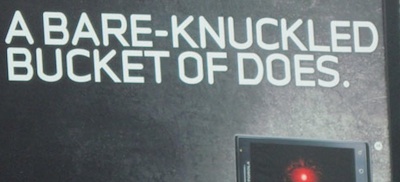Beautiful Info-Graphics From 1870
Posted on June 4th, 2010 at 7:37 pm by Steve

You wouldn’t expect to find such beauty in the Statistical Atlas of the United States, Based on the Ninth Census (1870) from the Library of Congress, would you? Sophisticated data visualizations, hand-calculated and hand-engraved, in beautiful colors, prepared by a staff headed by Francis A. Walker, M. A., superintedent of the ninth census.
The display above shows you, for each U. S. state and territory, the proportion of the church-going population (the colored boxes) relative to the total population (the shaded box in which the colored boxes are set), as well as the breakdown by the top 11 denominations!
I highly recommend that you check out all the charts and maps!
A Bare-Knuckled Bucket of Does
Posted on June 4th, 2010 at 2:11 pm by Steve

Lawrence Yang documents the obvious problem with Verizon’s $100 million integrated ad campaign for the Google/Droid phone. He was inspired by Nancy Friedman, who is a delight to read.
(Be sure also to read Nancy’s linked discussion of anthimeria, which is, loosely speaking, when someone verbs a noun.)
(Below: the actual $100 million ad campaign.)

Back When Nelson Mandela Was a Terrorist…
Posted on May 26th, 2010 at 4:38 pm by Steve

The government of Israel agreed to sell nuclear-armed Jericho missiles to the apartheid South African government in 1974.
London’s Guardian revealed on Sunday evidence that Shimon Peres signed a top-secret agreement with P. W. Botha to sell to South Africa the long-range Jericho nuclear missiles and warheads. Both men were the Defense Ministers of their respective nations, and each would later become head of state. Peres and the Israeli government deny that such an agreement ever existed. Ultimately, South Africa chose not to purchase the missiles from Israel, and later developed its own nuclear weapons. (The musical satirist Tom Lehrer joked in 1967 of their nuclear ambitions, “South Africa wants two – that’s right! – one for the black and one for the white!”)
Adding yet another layer of painful irony, in a letter to South Africa’s Secretary for Information in 1974, Shimon Peres wrote,
“This cooperation is based not only on common interests and on the determination to resist equally our enemies, but also on the unshakeable foundations of our common hatred of injustice and our refusal to submit to it.“
Indeed, one can only imagine “the unshakeable foundations of common hatred (…)” that Israel and apartheid South Africa shared.
And so it goes.
“Glenn Beck has Nazi Tourette’s”
Posted on May 14th, 2010 at 12:11 am by Steve
Authority, Control, and Trust in Human-Machine Systems
Posted on May 13th, 2010 at 1:58 pm by Steve

Automated systems in aircraft reduce some risks at the cost of increasing other risks. Incorrect or inconsistent applications of automation to complex human-machine systems can have unexpected and even deadly consequences.
NASA Ames Research facility has done a lot of thinking about the proper ways to design these systems. Dr. Charles Billings, in particular, has published a number of excellent papers on the subject. Here’s an excerpt from his 1995 paper, “Human-Centered Aviation Automation: Principles and Guidelines”, where he asks (and answers) a fundamental design question:
If the human operator cannot effectively oversee and retain management authority over his tools, he has lost authority over the entire operation. Will this be a tenable situation?
I believe it comes down to a matter of trust. Will we provide pilots with full authority, train them carefully, and trust them to do “the right thing”, whatever it is in particular circumstances? Or will we circumscribe pilot authority by making it impossible to damage the airplane, and in the process perhaps make it impossible to use its ultimate capabilities if they really need them…? My bias, based on a number of cases in which pilots have been able to recover from extreme emergencies, and other cases in which they did not recover but could have had they used all available resources, is that command authority should be limited only for the most compelling reasons, and only after extensive consultation with both test and line pilots or controllers at “the sharp end” of the system.
Boeing and Airbus, the world’s largest manufacturers of transport aircraft, seem to draw the “compelling reasons” line in different places. Under the Airbus computers’ “Normal Law” operating mode, the pilots cannot command inputs that would cause the airplane to enter an dangerous condition (for instance: they cannot stall the plane by increasing the angle of attack without adding thrust; the computer will prevent a stall from happening). Whereas Boeing’s approach is to make dangerous conditions increasingly difficult to cause (for instance: the Boeing’s control column will provide increased resistance against a pilot who is about to stall the airplane, making it physically more difficult for the pilot to cause this condition, but still allowing the possibility).
This continues to be an area of active study and discussion throughout the aviation community, and it has broader application as we interact more often with complex machine-controlled systems. Many pilots decry the apparent loss of airmanship due to the increase in cockpit automation.
The True Cost of Wind Energy
Posted on May 2nd, 2010 at 11:20 pm by Steve

The problem with wind energy is that it drives prices down! From Bloomberg news:
After years of getting government incentives to install windmills, operators in Europe may have become their own worst enemy, reducing the total price paid for electricity in Germany, Europe’s biggest power market, by as much as 5 billion euros some years, according to a study this week by Poeyry, a Helsinki-based industry consultant.
Jerome a Paris has an excellent discussion of the article over at The Oil Drum. He also links from there to an excellent (and entirely wonky) discussion of the proper pricing of wind power. It is a great article – one key takeaway is that wind power actually brings electricity prices down! Understanding that assertion requires a discussion of marginal costs, initial investments, demand curves, spot pricing, intermittency, externalities, and Spitzenlast (see above), but it’s totally worth it.
Another key point is that “market” pricing actually tilts the playing field toward fuel-based generation of electricity, because of its lower capital and debt-servicing requirements:
selecting market mechanisms to set electricity prices (rather than regulating them) is, again, not technology neutral: here as well, deregulated markets are structurally more favorable to fossil fuel-based generation sources than publicly regulated price environments.
So while I definitely wanted to highlight the issues around wind power (and point you to some excellent, informed commentary), I mostly just wanted an excuse to show that graph! SPITZENLAST!
Let’s Roll!
Posted on April 25th, 2010 at 11:51 am by Steve

Candelpin bowling is making a comeback! The Boston Globe Magazine is on the story this Sunday, featuring a local star bowler named Jeff Surette:
he just wants to bowl, just wants to take what he can get from the most difficult form of bowling on the planet, a particularly New England pursuit that is as hard as a Maine winter.
Classic!
Regular readers of the blog (hi Mutt!) will recall that we mentioned the story of another local bowler back in December, when his record-breaking three-string score of 514 was kept out of the record books because the foul line sensor was not turned on.

Mostly for Dan
Posted on April 19th, 2010 at 9:17 pm by Steve

I love xkcd.
Posted in funny, silly | Comments Off on Mostly for Dan
Somerville Breakfast Wars Draw Blood
Posted on April 13th, 2010 at 5:29 pm by Steve

If you’re local to Somerville (like some of us are, or were), then you’ve hopefully enjoyed a fantastic breakfast at either or both of Sound Bites and the Ball Square Café. There’s been bad blood between the two ever since Sound Bites expanded to the building next door, and the owners of the old space rented it to their son, who convinced the old Sound Bites chef to stay behind. The Somerville News’s blog picks up the story:
Police were called to Broadway today as a crowd scuffled and tried to separate the owners of SoundBites and Ball Square Cafe. It wasn’t the first time police were called to mediate Ball Square owner Mike Moccia and Yasser Mirza, of Sound Bites, but it may have been the most intense episode yet with witnesses reporting punches thrown and blood drawn.
Posted in community, local, odd | Comments Off on Somerville Breakfast Wars Draw Blood
In My Country, We Call It “Murder”
Posted on April 13th, 2010 at 4:59 pm by Steve

“We have shot an amazing number of people, but to my knowledge, none has ever proven to be a threat.”
That’s from General Stanley A. McChrystal, commander of US forces in Afghanistan, quoted in the New York Times. He’s referring specifically to soldiers at military checkpoints who engage in “escalation of force” against people, usually in vehicles, who behave in ways the soldiers perceive to be threatening.
The whole situation is extremely complicated, but it bears repeating: Afghanistan never attacked the United States. The people of Afghanistan never posed a threat to the United States. The alleged perpetrators of the attacks of September 11, 2001 were from Saudi Arabia, Egypt, the United Arab Emirates, and Lebanon (all nominal “allies” of the United States). The United States had no basis under international law for its invasion and occupation of Afghanistan: such behavior constitutes a war of aggression.
Sixty years ago, the United States government helped to articulate the gravity of a war of aggression: it is “not only an international crime; it is the supreme international crime, differing only from other war crimes in that it contains within itself the accumulated evil of the whole.”
Nine years into this unprovoked war, the US general in charge admits “we have shot an amazing number of people, but to my knowledge, none has ever proven to be a threat.” Though he was talking about checkpoints, his comments could easily apply to the enterprise as a whole.
What will be our reward here in the United States for such international cruelty?
“I tremble for my country when I reflect that God is just” (Thomas Jefferson, 1783).










